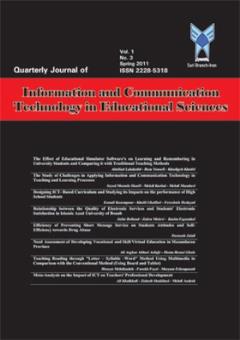بررسی تاثیر گیمیفیکیشن بر انگیزش و یادگیری دانش¬آموزان
الموضوعات :مائده صادقی سعیدآبادی 1 , زهرا طالب 2
1 - علوم تربیتی،آموزش ابتدایی،واحد تهران جنوب،دانشگاه آزاد اسلامی،تهران،ایران
2 - مدیر گروه برنامه ریزی درسی واحد تهران جنوب
الکلمات المفتاحية: گیمیفیکیشن, انگیزش, یادگیری.,
ملخص المقالة :
هدف پژوهش حاضر بررسی تاثیر گیمیفیکیشن بر انگیزش و یادگیری دانش¬آموزان ابتدایی بود. یک مطالعه¬ی نیمه-آزمایشی با طرح پیش¬آزمون – پس¬آزمون با گروه گواه می¬باشد. جامعه آماری پژوهش شامل کلیه دانش¬آموزان ابتدایی منطقه 11 شهر تهران در سال تحصیلی 1400-1399 می¬باشد که با روش نمونه¬گیری تصادفی ساده، 30 نفر انتخاب و به-صورت تصادفی در دو گروه 15 نفری (گروه آزمایش و گواه) جایگزین شدند. برای گروه آزمایش آموزش مبتنی بر گیمیفیکیشن براساس کتاب جعبه ابزار گیمیفیکیشن مارچوسکی آندرزی (اختری، 1400)، مسابقه¬ای با عنوان دانستنی¬ها به-مدت 4 هفته و هر روز برای دانش¬آموزان گروه آزمایش اجرا شد و گروه گواه هیچ آموزشی را دریافت نکرد. برای جمع-آوری داده¬ها از پرسشنامه استاندارد انگیزش تحصیلی هارتر و آزمون یادگیری آزمون محقق¬ساخته استفاده شد. یافته¬ها نشان داد که رابطه معناداری بین متغیر گیمیفیکیشن و متغیر انگیزش و یادگیری دانش آموزان ابتدایی وجود دارد. می¬توان نتیجه گرفت که استفاده از گیمیفیکیشن هنگام تدریس منجر به افزایش انگیزش و یادگیری دانش¬آموزان می¬شود. بنابراین پیشنهاد می¬شود که برای افزایش انگیزش و یادگیری برای موفقیت و پیشرفت تحصیلی از برنامه گیمیفیکیشن در امر آموزش دانش¬آموزان ابتدایی استفاده شود.
References
Abdi, H. (2020). The effect of gamification education on math anxiety and math motivation of 9th grade students. Master's thesis, Tarbiat Deir Shahid Rajaei University, Faculty of Basic Sciences. (in Persian).
Alijani Alijanvand, Iskandar, Rashidi, Abdulahi, Safiya, Aqourn Loui, ... & Mehran. (2022). Investigating the effect of online multi-user game in cooperative situation on students' academic motivation and learning. Information and Communication Technology Quarterly in Educational Sciences , 13 (2), 101-121.
Ansari Ardali, S., & Raisi Ardali, R. (2021). The role of educational games in increasing student learning. Recent Advances in Humanities Studies, 38(4), 75-82.
Armier Jr, D. D., Shepherd, C. E., & Skrabut, S. (2016). Using game elements to increase student engagement in course assignments. College Teaching, 64(2), 64-72.
Asghari, M. (2018). Hamshahri newspaper, 7558 (27).
Bagheri, M., & Talimi, R. (2021). The effect of gamification on students' learning and memorization of environmental concepts. Educational Scientific Quarterly of Environment and Sustainable Development, 3, 23-32.
Baptista, G., & Oliveira, T. (2019). Gamification and serious games: A literature meta-analysis and integrative model. Computers in Human Behavior, 92, 306-315.
Cunningham, K., & Zuckerman, G. (2021). Gamification design. Translated by Ali Akhtari and Kamran Hatami. Tehran: Sobh Mozur Publications.
Duggal, K., Gupta, L. R., & Singh, P. (2021). Gamification and machine learning inspired approach for classroom engagement and learning. Mathematical Problems in Engineering, 2021, 1-18.
Ghasemi Erganeh, M., Pourrostaei Ardakani, S., Mohseni Ejieh, A. R., & Fathabadi, R. A. (2019). The effectiveness of gamification-based education in academic motivation of students with intellectual disability. Scientific Journal of Education Technology, 15(3), 429-438.
Gholamipour, N., & Tajrobehkar, M. (2022). The effect of online multi-user educational computer games on working memory and innovative performance of dyslexic students. Information and Communication Technology Quarterly in Educational Sciences , 13 (3), 5-26.
Glover, I. (2013, June). Play as you learn: gamification as a technique for motivating learners. In Edmedia+ innovate learning (pp. 1999-2008). Association for the Advancement of Computing in Education (AACE).
Haji Morad, S. (2015). Perusing scales the readiness of undergraduate students[master’s thesis]. Tehran: University of Tehran.
Kusuma, G. P., Wigati, E. K., Utomo, Y., & Suryapranata, L. K. P. (2018). Analysis of gamification models in education using MDA framework. Procedia Computer Science, 135, 385-392.
Legaki, N. Z., Xi, N., Hamari, J., Karpouzis, K., & Assimakopoulos, V. (2020). The effect of challenge-based gamification on learning: An experiment in the context of statistics education. International journal of human-computer studies, 144, 102496.
Nasresfahani, Z., Aliabadi, Kh., & Zarei Zwarki, Z. (2017). Case comparison of 9educational computer games with the general principles and standards of designing educational computer games. New Media Studies Quarterly, 4(15), 281-315.
Perryer, C., Celestine, N. A., Scott-Ladd, B., & Leighton, C. (2016). Enhancing workplace motivation through gamification: Transferrable lessons from pedagogy. The International Journal of Management Education, 14(3), 327-335.
Rahbary, M., Soleimani, N., Soltanifar, M., Abtahi, A., & Zamani Moghadam, A. (2021). Providing a comprehensive model to evaluate the effectiveness of gaming plans in online environments. Information and Communication Technology Quarterly in Educational Sciences , 12 (2 (consecutive 46)), 27-47.
Saleem, A. N., Noori, N. M., & Ozdamli, F. (2022). Gamification applications in E-learning: A literature review. Technology, Knowledge and Learning, 27(1), 139-159.
Safai-Mohved, S. & Rikhtehgarzadeh, S. M. (2018). The effects of using gamification on the motivation and learning of employees in the cooperative management training course of Pars Oil and Gas Company, Tehran Province. Human Resource Education and Development Quarterly, 16(5), 79-96.
Sailer, M., Hense, J., Mandl, H., & Klevers, M. (2017). Fostering development of work competencies and motivation via gamification. Competence-based vocational and professional education: Bridging the worlds of work and education, 795-818.
Saif, A. A. (2021). Modern educational psychology. Tehran: Aghaz Publications.
Shabani, H. (2020). Educational skills, teaching methods and techniques, first and second volumes, Tehran: Samit Publishing House.
Sharfinia, M., Emadi, B., & Jantian, A. H. (2021). Investigating the effect of e-learning on motivating elementary school students. Quarterly Journal of New Developments in Educational Management, 3(1), 16-29
Toda, A. M., do Carmo, R. M., da Silva, A. P., Bittencourt, I. I., & Isotani, S. (2019). An approach for planning and deploying gamification concepts with social networks within educational contexts. International Journal of Information Management, 46, 294-303.
Toda, A. M., Klock, A. C., Oliveira, W., Palomino, P. T., Rodrigues, L., Shi, L., ... & Cristea, A. I. (2019). Analysing gamification elements in educational environments using an existing Gamification taxonomy. Smart Learning Environments, 6(1), 1-14.
Zichermann, G., & Linder, J. (2010). Game-based marketing: inspire customer loyalty through rewards, challenges, and contests. John Wiley & Sons.


